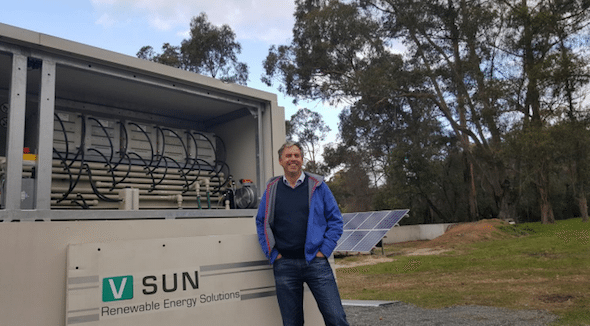
A Western Australian farm near Busselton that has installed solar and battery storage to avoid paying for a new connection to the grid, has chosen a vanadium redox flow battery for the project, in what is believed to be a first for Australia.
The battery – a 100kWh CellCube built in Austria by Gildemeister and installed by Australian Vanadium Limited (AVL) subsidiary VSUN – will store the energy from a 15kW solar PV system, which the property’s owners hope will make them 90 per cent energy self-sufficient.

According to AVL, VRFB have lower energy density compared to lithium-ion, but since the tanks can be scaled up to any size, have the ability to store a lot more total energy, so a well suited to stationary applications and to storing large amounts of renewable energy for later use.
Another advantage, says AVL, is that vanadium flow batteries can cycle more often and to greater depths of discharge (100%), giving them a longer life that li-ion batteries. They are also safer, in that they are not prone to the thermal runaway known to occur with lithium-ion.
The cost of the system, the solar and storage, was high – $164,000, says AVL – but evidently that cost was weighed against the cost of connecting a new building to the grid and found to be economic.
Farm owner, Lucy Stuart, said she planned to build a new house at the Busselton property, a farm which currently operates a small tree nursery with irrigation and power supplies.
“As part of building a new house, obviously, the first thing you look at is how to get grid power to the house,” she said.
“We started doing some research. The (CellCube)… will deliver power for the entire farm without us needing to then extend grid power to the house. So it’s starting to look cost-effective from that point of view.
“Then we found there are actually a lot of added benefits. We currently get single-phase power out to the farm – which is normal, that’s typical – but this system will produce three-phase power, which is what we’re getting in the city here.
“We can expand the workshop, if we can get that three-phase power,” Stuart said. “There are often interruptions to the power supply in rural areas and installing a vanadium battery will allow us to use appliances with a heavy draw-down, without having to time our usage around off-peak hours.
“And the third thing is a bonus, but it’s important to us – it might not be important to everyone – but we are fairly committed to sustainable, clean energy. So it’s the perfect three-point ‘tick in the box’ for us.”
“Theoretically, we hope to be 90 per cent self-sufficient with our power. We are also registered as a power exporter, so we can sell back to the grid. So, although that’s not initially our primary desire, it’s going to be a nice thing to have.”
AVL managing director Vincent Algar said he expected the Busselton farm installation to be the first of many on Australian farms, due to their capacity to store large amounts of solar and wind power.
“They are a perfect option for many off-grid farming operations, particularly in the more remote parts of WA,” Algar said.
Algar said one of the benefits of large battery storage systems like the CellCubes included the ability to time-shift up to 10 hours of power usage, by storing energy from the solar for later use.
Aside from farming, he said the storage systems would be economic for a range of industries, including mining and resources.
“Many WA farmers will find installing a vanadium battery, with appropriate solar panels, will be cheaper in the long term, than connecting to the grid or running diesel generators,” he said.

Sophie is editor of One Step Off The Grid and editor of its sister site, Renew Economy. Sophie has been writing about clean energy for more than a decade.
